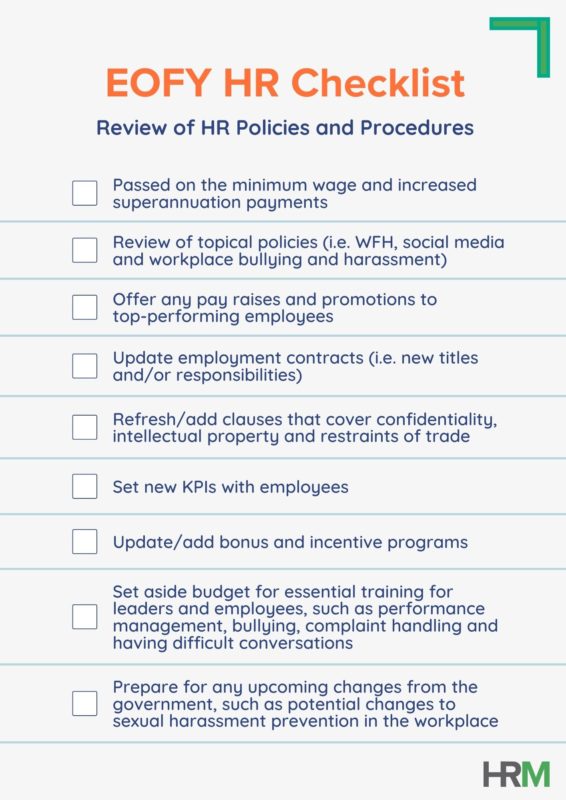Now is the time to get your house in order and review important HR policies and procedures, as we move into the new financial year. A employment law specialist shares fives things to keep in mind.
The new financial year is in full swing, so now it’s time for HR professionals to undertake a policies and procedures clean up to ensure your business remains compliant.
The end of the financial year isn’t just about getting your organisation’s finances in order. While tax dominates business discussions in the lead-up to 30 June, it’s equally important to do an employment law review.
Doing nothing has the potential to have long-lasting consequences, particularly if key policies and procedures are out of date. For example, working from home conditions, social media guidelines and what constitutes a complaint continue to evolve, so it’s essential that the HR functions keeps pace.
Now that you’ve likely got your end-of-year finances in check, it’s time to move your focus on to your HR policies and procedures. This HR checklist should help to get you started (see bottom of article for an infographic summarising the article).
1. General hygiene factors
First things first, has the minimum wage increase of 5.2 per cent been passed on to staff? Don’t forget about staff covered under a Modern Award as there could be underpayment consequences later in the year.
The minimum wage bump also impacts superannuation payments. Superannuation payments themselves have also gone through a slight increase to 10.5 per cent. Have you remembered to increase super payment?
You should also review HR policies that cover ‘hot-button’ issues, including:
- Social media
- Working from home/remote working
- Workplace bullying
- Sexual harassment
- Complaints and complaint handling
Many companies are struggling with work-from-home arrangements now that lockdowns are over – just ask Elon Musk! It’s essential that businesses set working-from-home parameters and standards, including flexibility of hours. For example, sales staff should be available to take calls between normal business hours.
2. Review employment contracts
In addition to passing on the 5.2 per cent increase to employees on the minimum wage and the modern award wage increase of 4.6 per cent, the start of the new financial year is the perfect time to review employment contracts.
At a minimum, terms of employment, role/position descriptions and KPIs should all be reviewed.
Pay rises linked to performance and salary reviews should also be incorporated into employment contracts in addition to confidentiality, intellectual property and restraint of trade clauses.
3. Recruitment and retention measures
Attracting and retaining key staff is a big challenge at the moment, irrespective of the sector. However, there are steps you can take to keep high-performing employees. For example:
- Do you have a bonus policy in place? If so, when was the last time it was assessed and reviewed?
- Does your business have an incentive program? Is it in writing and clearly communicated to employees? And does it factor in unforeseen circumstances? For example, a staff member resigns, is injured or incapacitated.
Remember, bonuses and staff incentives should always be linked to agreed-upon KPIs which hopefully align with the targets of the organisation.
The start of the financial year is also a great time to update organisational charts and overhaul position descriptions – all of which can help in re-engaging employees and setting them up with new challenges and promotions.
4. Consider management training
It’s essential business leaders put aside a budget to deal with the following scenarios:
- Performance management
- Workplace bullying
- Illness or injury in the workplace
- Complaint handling
- Sexual harassment
In my experience, the majority of claims we manage on behalf of clients’ stem from managers choosing not to have difficult conversations, conducting them in a porr manner or having them too late in the game.
It is essential leaders are given the necessary tools to manage staff, including the ability to have difficult but important conversations with employees. By investing in management, you will help alleviate risk as well as retain staff.
Want to arm yourself, or your team, with the skill of acing difficult conversations? AHRI’s short course, ‘Having Difficult Conversations‘, is exactly what you need. Tickets for the August 24 intake are selling fast – don’t miss out!
5. Workforce documentation
Is your business prepared for the potential changes flagged by the new Australian Government? The definition of a casual employee and contractor is likely to change, along with sexual harassment laws, which will put the onus on employers to eliminate sexual harassment.
It’s important that you:
- Review and understand the likely changes
- Review wage structures
- Review casual employment and contractor arrangements and understand what effect this may have on your business if rules change.

Download HRM’s checklist here.
Jonathan Mamaril is a Director at NB Lawyers.


Great reminder of essential cyclic reviews